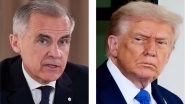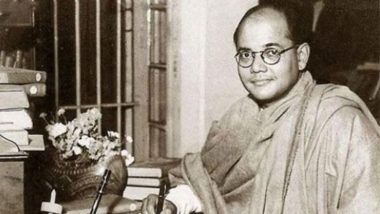August 18, marks the 74th year of the fateful plane ride that Subhas Chandra Bose took in 1945, which crashed in Japanese-occupied Formosa, now known as Taiwan. However, his death remains a mystery. Conspiracy theories ruled around his death, whether Netaji died due to an accidental plane crash or it was plotted. Some also believed that he survived the crash and spent his old age hiding. Russia Unable to Find Documents Linked to Netaji Subhas Chandra Bose on India's Request.
Born on January 23, 1897, in Cuttack, Orissa, Netaji belonged to a family of an advocate. Being a follower of Swami Vivekananda, he stressed out the importance of religion. He later went to the University of Cambridge in England to prepare for the ICS (Indian Civil Service). In 1920, he passed the ICS, but after hearing of the nationalist turmoils in India, Bose hurried back to India. Here are some interesting facts about him.
Facts About Netaji Subhas Chandra Bose:
- Bose was a brilliant student and always secured top ranks throughout his schooling and college. In 1918, he completed his Bachelor of Arts in Philosophy with a first-class score.
- Earlier, Netaji had been the leader of the younger wing of the Indian National Congress (INC) in later 1920s and 1930s, rising to become Congress President in 1938 and 1939. He was later expelled from the position in 1939 following differences with Mahatama Gandhi and other Congress leaders.
- Between the period of 1921-1941, Bose was imprisoned 11 times in various jails due to his struggle for Indian Independence Day.
- "Tum Mujhe Khoon Do, Me Tumhe Azaadi Dunga (Give me blood, and I shall give you freedom)" is the most famous dialogue by Subhas Chandra Bose. He said this during a speech for the Indian National Army (INA) at a rally of Indians in Burma.
- Netaji Bose believed that Mahatama Gandhiji's tactic of non-violence was not enough to secure independence day.
- Netaji featured on the Indian stamps during 1964, 1993, 1997, 2002, 2016 and 2018. Recently, one of the islands in Andaman and Nicobar was renamed to Netaji Subhas Chandra Bose Island.
Subhas Chandra Bose, the born leader, was respected by not just the Indians but also the Japanese. "The Japanese are deeply moved by Bose's strong will to have led the Indian independence movement from British rule," Japanese Prime Minister Shinzo Abe said during his visit to Kolkata in 2007.
(The above story first appeared on LatestLY on Aug 17, 2019 04:31 PM IST. For more news and updates on politics, world, sports, entertainment and lifestyle, log on to our website latestly.com).













 Quickly
Quickly


